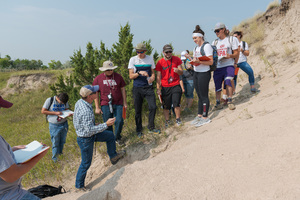Environmental Geoscience now available to CSC students

CHADRON – If students are interested in making an impact on the world, Dr. Mike Leite, professor of Physical and Life Sciences, has a major for them. Beginning in the Fall of 2018, Environmental Geoscience, began being offered at Chadron State College.
“If a student is interested in making an impact on the future, including sustainability and improving living standards for the local, regional and global communities, and wants to do something but doesn't know exactly what to do, Environmental Geoscience will help develop the skills to solve these problems,” Leite said. “Environmental Geoscience is hugely important because critical issues of global warming and water are facing humanity. You have to think of big things and how that's going to affect a resource people rely on. You can't take that for granted and working on these problems ultimately creates economic growth. These are all things we tackle head on in this field of study.”
In addition to the Environmental Geoscience major, an Environmental Geoscience minor is also available.
Leite said he thinks students who study agriculture, biology, and even legal studies and business, would benefit from the minor.
“Environmental Geoscience can be a really helpful minor for students because there are so many interdisciplinary elements,” he said. “Students without a science major could have a science component to their degree and that would make them attractive to potential employers. Environmental Geoscience has flexibility, and students with diverse interests can be involved with it.”
The path to bringing Environmental Geoscience to CSC took more than a year before it received approval at a Nebraska State College System Board of Trustees’ meeting in the spring.
Initially, Physical and Life Sciences Instructor Jennifer Balmat had the idea to add Environmental Geoscience and worked with Leite on a proposal.
“We were brainstorming about a lot of things during a meeting and one of the things we kept coming back to was ‘Where do we send our students to work and are we really preparing them for what they need?’” Balmat said. “When looking at the available jobs within our state in Geoscience, the majority of them are in the Environmental Geoscience realm because Nebraska’s biggest resources are water and soil.”
Once the Physical and Life Sciences department was on board, Leite and Balmat took the proposal to Chadron State’s Academic Review Committee and that resulted in beneficial conversations, Leite said. Once the proposal passed through Academic Review, it was given to the Board of Trustees for final approval.
“It was a rigorous process and our colleagues evaluated a lot of things with the proposal and helped make it better,” Leite said.
Balmat said the Environmental Geoscience option is offered face-to-face, while the traditional Geoscience option is both face-to-face and online.
“Environmental Geoscience is unique, especially in our region, but we have to address soil resources, climate resources and global climate change as a global society,” Balmat said. “There are no other Nebraska schools that offer it and we anticipate the Environmental Geoscience option will prepare students for the workforce immediately after college.”
Leite and Balmat agreed the need for Environmental Geoscientists is also a factor in adding the option. Leite said according to the Bureau of Labor Statistics, a large number of geoscientists are retiring, creating a need for more geoscientists to enter the workforce.
“It’s important to know that scientists don’t work alone and this option wasn’t done alone either,” Balmat said. “We work as a team in Environmental Sciences - no one is working independently and we’ll continue to work as a team to solve problems.”
Leite added another unique item about the Environmental Geoscience option, a required internship.
“Internships involve a lot of footwork, but there are a lot of them out there,” he said. “We require students to have an internship with their field of interest and that really gives students a leg up when they graduate and are seeking employment.”
Category: Campus News, Physical and Life Sciences

